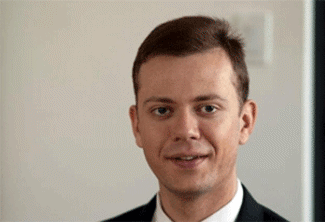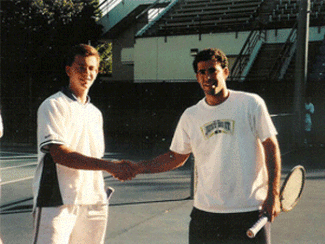By Alex Pasternack
January 24, 2013
NOTICE: THIS WORK MAY BE PROTECTED BY COPYRIGHT
YOU ARE REQUIRED TO READ THE COPYRIGHT NOTICE AT THIS LINK BEFORE YOU READ THE FOLLOWING WORK, THAT IS AVAILABLE SOLELY FOR PRIVATE STUDY, SCHOLARSHIP OR RESEARCH PURSUANT TO 17 U.S.C. SECTION 107 AND 108. IN THE EVENT THAT THE LIBRARY DETERMINES THAT UNLAWFUL COPYING OF THIS WORK HAS OCCURRED, THE LIBRARY HAS THE RIGHT TO BLOCK THE I.P. ADDRESS AT WHICH THE UNLAWFUL COPYING APPEARED TO HAVE OCCURRED. THANK YOU FOR RESPECTING THE RIGHTS OF COPYRIGHT OWNERS.

Aleksey Vayner, the Yale graduate who garnered the Internet's mistrust for a video résumé he made called “Impossible is Nothing,” died on Saturday at the age of 29. According to IvyGate, the website that first reported on his fabrications in 2006, a spokesman for the New York Medical Examiner's office said the cause of death was pending investigation, although one family member has attributed it to a heart attack from an overdose of medication.
A driven athlete, coach, and entrepreneur, Aleksey had become synonymous with the perils of unintended Internet fame. Born Aleksey Garber, he had emigrated from Uzbekistan and settled in New York City at a young age with his mother, where he attended The Dwight School before attending Yale in 2002.
An interview with Vayner, conducted in 2010 at ROFLCon
His fiasco began in 2006 with "Impossible is Nothing," a video he made and sent to the investment bank UBS as part of a summer job application. Peppered with inspirational quotes and almost tongue-in-cheek in style, the video may have been the "world's greatest" resume, quipped Ben McGrath at the time, for its depiction of Aleksey as a super-human Renaissance Man: he was a tennis and skiing star, an expert ballroom dancer, capable of bench-pressing nearly five hundred pounds and slicing bricks with his fist. Despite some fibs, he acknowledged, these were things he actually did.
Even as a pre-freshman, he was featured in a 2002 issue of the Rumpus, the campus humor magazine, for his tales of studying in Tibet under the Dalai Lama and participating in a “Blood Sport”-type tournament in Thailand. He said he never made those exact claims, but Aleksey's reptuation for telling outlandish stories had been established.
The video was, Aleksey said, intended to be seen only by recruiters at UBS; but someone at the bank forwarded it to friends. Soon, it was spreading across Wall Street and then the Internet. And the Internet laughed hard, and harder. Once it went viral, Aleksey became the target of endless barbs, parodies (including one very funny one by Michael Cera), and even death threats. When I met him a few years later, he said the backlash had been surprising, humbling, and deeply hurtful.
“I felt kind of like that Star Wars Kid,” he said, referring to Ghyslain Raza, the Canadian who sought therapy after a video he had made in private fell into the hands of classmates, who turned him into an Internet laughing stock. “I hit rock bottom."
At the time a spokesman for UBS said in a statement, "As a firm, UBS obviously respects the privacy of applicants’ correspondences and does not circulate job applications and resumes to the public. To the extent that any policy was breached, it will be dealt with appropriately.”
Aleksey would make legal threats against UBS, YouTube, and IvyGate. Instead of complying with a cease-and-desist letter regarding Aleksey's video, the blog instead launched a larger investigation into his backstory. That uncovered other fantasies, including a book he had authored about female Holocaust survivors that appeared to have been plagiarized. Still, Aleksey's threats managed to keep copies of the original resume video scarce.

Aleksey with Pete Sampras
We met in 2010 at ROFLCon. Aleksey was friendly and gracious, but guarded and reserved. He had come to the meme conference to sit on a panel with Jack Rebney, aka Winnebago Man, whose apoplectic videos had also made him the subject of ridicule first among a certain crowd of VHS owners, and later on YouTube. As I understood it, Aleksey hadn't discussed his saga in public before. Afterwards, I asked him if we could sit for an interview the following day. His story was not a subject that seemed easy for him to discuss, but I was there to report on Internet culture. I had met David After Dentist and the Gregory Brothers, but I was curious to see what the flipside of Internet fame was like.
Even in an atheletic sweatshirt and running pants, he looked like he was wearing a suit, and acted every bit a gentleman. In a room at the MIT Media Lab and with his wife sitting to the side, he described his former obsession with weight-lifiting, his more recent passion for martial arts, tennis coaching, Buddhism and business. He paid tribute to his judo coach, Radomir Kovacevic. He ruminated on the perils of web culture, and the backlash that would wreck him personally.
The mean comments were especially hurtful, and deeply counfounding to him too; he admitted some parts of the video were exaggerations--the skiing shot could have been taken from another video by accident, he said--but this video was also a demonstration of who he was and aspired to be. "It's not like a killed a man or anything," he said. "I made a video, that's all."
“You’re going to be in shock for a while, when you see what people have written,” Blake Boston, aka Scumbag Steve, advised in an open letter last year to another unintentionally famous web celebrity, "Annoying Facebook Girl." “But the most important and self-preserving thing you can do is know that it’s not you. You can’t take this personally. I’ll say that again, you can’t take this personally. Hell if I did… well let’s not go there.”
“The part that will suck though is that there will always be those people that somehow think YOU did this, that you made the meme, and that you could stop it if you wanted to,” writes Boston. “The internet birthed you and they’ll decide when you (the meme) will die.”
In a 2008 blog post, Aleksey described how he responded to the criticism. "Something Tolstoy wrote comes to mind: 'Everyone thinks of changing the world, but no one thinks of changing himself.' It is easier to criticize others than to criticize oneself. I often find myself looking for faults in athletes on TV, even though I realize that I cannot do the things they do. I think that the amount of misinformation about me and the caricatures created make it easy for people to see me in a critical light."
After college, he married and moved back to New York City, where he taught tennis, blogged, and started companies. At one, Vayner Capital Management, he was a financial advisor; another, a charity called Youth Empowerment Strategies, designed reading software; another, Elite Internet Marketing, addressed a topic that, in a way, he came to know quite well. Last year, he reportedly changed his name to Alex Stone, but his Facebook page calls him Alex S. Vayner.
"Impossible is Nothing"
His online profiles said he had attended the London School of Economics--although there is no record of a Vayner at the school's website--and that he was working at the ebusiness automation company QuickPayPro.com. Previously, he wrote, he had worked for Hilbert Technology, Morgan Stanley, and the Tomkin Real Estate Group. Googling his name yields vitriolic comments but also a steady stream of curiosity, inspired by his legend as much by his notoriety, and the desire to answer that eternal American question: "Where are they now?"
Or, "What is the point of this?" someone asked at the start of a 2010 thread about Aleksey on wallstreetoasis.com. "You are just making the guy's life miserable." The original poster wrote back: "No bad intention here. much respect for this guy. He's still hustlin'. good to see him, he's still trying hard!"
With anonymity and distance, the web accommodates fakery in a way that no other social medium ever has (see Manti Te'o). For similar reasons, it's also shown a remarkable capacity for outing fabricators, and for shaming and bullying them too. After Invisiblle Children's "Kony 2012" video raised questions about the group's credibility last year, the video’s creator, Jason Russell, lost his nerve on a San Diego street corner, leading to an altogether different kind of viral video, this one involving public nudity; he ended up seeking psychological help and was later interviewed by Oprah. The culprit, he said, was "extreme exhaustion, stress, and dehydration," brought on by his newfound fame.
That same week, a jury in New Jersey delivered a guilty verdict in the cyberbullying case of university student Tyler Clementi, who killed himself days after his roommate filmed and broadcast a web cam video of Clementi kissing another man. The roommate was found guilty for violating Clementi's privacy, and served 20 days in prison.
The threat of bullying, the old-fashioned kind, has reared its head in the aftermath of the suicide of Aaron Swartz, who was dogeddly pursued by federal prosecutors for his hacktivism. And the impassioned response to his death has demonstrated again the power of digital activism to mobilize against injustice.
Aleksey's struggle with his Internet reputation offers an inverse lesson, highlighting the kind of terrible pressures and venom the web sometimes carries too. For his video, he became a kind of anti-folk hero, the target of the snark of blogs and the cruel justice of 4chan, where a new kind of bullying criminal justice system takes aim at "crimes" like fabrication and immodesty--even sometimes in the form of nothing more than a crude anonymous comment.
And yet, these impulses of fibbing and boasting, aren't alien to the web. Here we craft our profiles to contain the best possible things, and, when we have to, find subtle ways to humblebrag to our friends or to whomever is listening.
Years after the incident, Aleksey was still not comfortable with the attention he garnered, but he took his notoriety in stride. Friends said he had moved past the "Impossible is Nothing" saga, spurred on by the same ambitions that were apparent in the video.
"He was a guy who always had a lot of plans and ideas, and was very busy with stuff that was actually working," said Vasco Mladenov, who befriended Aleksey at the tennis courts at St. John's University. "I would help him [at tennis], and he would help me. I always knew that he would have my back. He was a very positive guy and a very creative person, someone who had a lot of belief in what he was doing."
He would occasionally comment on his lasting fame on his Facebook wall, alongside inspirational quotes from authors and mentors. "Be who you are and say what you feel because those who mind don't matter and those who matter don't mind," he wrote on Sept. 13, 2011, quoting Dr. Seuss.

A comment left by a male friend on Januaray 18, the day before his death, is cryptic. "Do not, anyone, sell this idiot ANY pills!" it reads. The rest, written in Russian, says, "Damned egoist, pick up the phone, who's going to take care of mom? [you could] sell your source code and fuck off to costa rica. [even] paypal would pay you 2-3 hundred thousand. pick up the fucking phone."
The circumstances aren't clear; a request to the friend for comment has not yet been returned. At 11.16 pm that night, Aleksey shot back, writing in phonetic Cyrillic: "Volodia, idi k cherty"--Volodia, go to hell.
Aleksey's last postings, dated January 16 and 17, were a photograph of Yale's Sterling Memorial Library, with the note "how i miss thee," and a quotation by Helen Keller:
“Security is mostly a superstition. It does not exist in nature, nor do the children of men experience it as a whole. Life is either a daring adventure, or nothing.”
After his death was announced on his Facebook wall on Saturday, Aleksey's friends and family paid their respects in dozens of wall posts. "This is unreal," wrote one of his tennis students. "You were the best coach I ever had! I will keep everything you said to me . I can't stop crying. You were amazing. Even though we just started to play together. I improved greatly . I will do all my excersise I will eat better and I hope you are in a better place. I will do everything you told me." Many of the two dozen or so posts complimented his awesome serve, which, he had claimed, topped out at a 140 miles per hour. "You always went out of your way to say hello and you were always ready to jump on a court and rip some balls," wrote another friend. "You had larger than life ambition and an equally big heart. I hope you have found peace."
A memorial service for Alexey is scheduled for Saturday, January 26, in New York.
